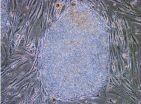(Press-News.org) Researchers from the RIKEN Research Centre for Allergy and Immunology in Japan report today that they have succeeded for the first time in creating cancer-specific, immune system cells called killer T lymphocytes, from induced pluripotent stem cells (iPS cells). To create these killer cells, the team first had to reprogram T lymphocytes specialized in killing a certain type of cancer, into iPS cells. The iPS cells then generated fully active, cancer-specific T lymphocytes. These lymphocytes regenerated from iPS cells could potentially serve as cancer therapy in the future.
Previous research has shown that killer T lymphocytes produced in the lab using conventional methods are inefficient in killing cancer cells mainly because they have a very short life-span, which limits their use as treatment for cancer. To overcome these problems, the Japanese researchers led by Hiroshi Kawamoto and presenting their results in the journal Cell Stem Cell online today, reprogramed mature human killer T lymphocytes into iPS cells and investigated how these cells differentiate.
The team induced killer T lymphocytes specific for a certain type of skin cancer to reprogram into iPS cells by exposing the lymphocytes to the 'Yamanaka factors'. The 'Yamanaka factors' is a group of compounds that induce cells to revert back to a non-specialized, pluripotent stage. The iPS cells obtained were then grown in the lab and induced to differentiate into killer T lymphocytes again. This new batch of T lymphocytes was shown to be specific for the same type of skin cancer as the original lymphocytes: they maintained the genetic reorganization enabling them to express the cancer-specific receptor on their surface. The new T lymphocytes were also shown to be active and to produce the anti-tumor compound interferon γ.
"We have succeeded in the expansion of antigen-specific T cells by making iPS cells and differentiating them back into functional T cells. The next step will be to test whether these T cells can selectively kill tumor cells but not other cells in the body. If they do, these cells might be directly injected into patients for therapy. This could be realized in the not-so-distant future." explains Dr Kawamoto.
###
For more information please contact:
Juliette Savin
Global Relations Office
RIKEN
Tel: +81-(0)48-462-1225 / Fax: +81-(0)48-463-3687
Mail: pr@riken.jp
Reference
Raul Vizcardo, Kyoko Masuda, Daisuke Yamada, Tomokatsu Ikawa, Kanako Shimizu, Shin-ichiro Fujii, Haruhiko Koseki, Hiroshi Kawamoto "Regeneration of human tumor antigen-specific T cells from iPS cells derived from mature CD8+ T cells." Cell Stem Cell, 2013
About RIKEN
RIKEN is Japan's flagship research institute devoted to basic and applied research. Over 2500 papers by RIKEN researchers are published every year in reputable scientific and technical journals, covering topics ranging across a broad spectrum of disciplines including physics, chemistry, biology, medical science and engineering. RIKEN's advanced research environment and strong emphasis on interdisciplinary collaboration has earned itself an unparalleled reputation for scientific excellence in Japan and around the world.
Website: www.riken.jp Find us on Twitter at @rikenresearch
For more information about the RIKEN Research Centre for Allergy and Immunology please visit http://www.rcai.riken.jp/english/
END
The human body contains immune cells programmed to fight cancer and viral infections, but they often have short lifespans and are not numerous enough to overcome attacks by particularly aggressive malignancies or invasions. Now researchers reporting in two separate papers in the January 4th issue of the Cell Press journal Cell Stem Cell used stem cell technology to successfully regenerate patients' immune cells, creating large numbers that were long-lived and could recognize their specified targets: HIV-infected cells in one case and cancer cells in the other. The findings ...
STANFORD, Calif. — When a young athlete dies unexpectedly on the basketball court or the football field, it's both shocking and tragic. Now Stanford University School of Medicine researchers have, for the first time, identified the molecular basis for a condition called hypertrophic cardiomyopathy that is the most common cause for this type of sudden cardiac death.
To do so, the Stanford scientists created induced pluripotent stem cells, or iPS cells, from the skin cells of 10 members of a family with a genetic mutation that causes the condition. The researchers then ...
In a novel use of gene knockout technology, researchers at the University of California, San Diego School of Medicine tested the same gene inserted into 90 different locations in a yeast chromosome – and discovered that while the inserted gene never altered its surrounding chromatin landscape, differences in that immediate landscape measurably affected gene activity.
The findings, published online in the Jan. 3 issue of Cell Reports, demonstrate that regulation of chromatin – the combination of DNA and proteins that comprise a cell's nucleus – is not governed by a uniform ...
The memory problems that many women experience in their 40s and 50s as they approach and go through menopause are both real and appear to be most acute during the early period of post menopause. That is the conclusion of a study which appears today in the journal Menopause.
"Women going through menopausal transition have long complained of cognitive difficulties such as keeping track of information and struggling with mental tasks that would have otherwise been routine," said Miriam Weber, Ph.D. a neuropsychologist at the University of Rochester Medical Center (URMC) ...
Pioneering research presented at the Fertility 2013 conference today (Thursday 3 January 2013) shows that a large proportion of male cancer patients are missing out on appropriate fertility advice.
Sperm banking is routinely recommended for all men diagnosed with cancer who are at risk of long-term infertility, caused by treatment such as chemotherapy and radiotherapy.
Infertility can be permanent or temporary depending on the individual's circumstances and men may need to attend follow-up appointments to assess their fertility in the years after they have been discharged ...
Two researchers from the Polytechnic University of Valencia and the University of Oxford have proven that hot chocolate tastes better in an orange or cream coloured cup than in a white or red one. The study adds to recent research demonstrating how our senses perceive food in a different way depending on the characteristics of the container from which we eat and drink.
"The colour of the container where food and drink are served can enhance some attributes like taste and aroma," as explained to SINC by Betina Piqueras-Fiszman, researcher at the Polytechnic University ...
The research, carried out at Imperial College London and the University of Warwick, suggests these signals could be targets for drugs that would help prevent miscarriage in women who are particularly vulnerable.
At the start of pregnancy, the fertilised embryo must embed itself in the lining of the uterus. The uterus is only receptive to embryos for a few days in each menstrual cycle, ensuring that embryos can only implant at the right stage of development. Currently scientists know only a few details about the biological processes that control when an embryo can be implanted.
In ...
Jerusalem, January 3, 2013 – All living cells keep their cellular calcium concentration at a very low level. Since a small increase in calcium can affect many critical cellular functions (an elevated calcium concentration over an extended period can induce cell death), powerful cellular mechanisms ensure that calcium concentration quickly returns to its low level.
It is known that impairments of cellular calcium regulation underlie almost all neurodegenerative diseases. For example, age-related loss of calcium regulation was shown to promote cell vulnerability in Alzheimer's ...
Up to 75 per cent of patients who take statins to treat elevated cholesterol levels may suffer from muscle pain. Scientists at the Center for Healthy Aging at the University of Copenhagen have now identified a possible mechanism underlying this unfortunate side effect. The results have just been published in the well-reputed Journal of American College of Cardiology.
Statin is a class of drugs which are used to treat high levels of blood cholesterol by way of inhibiting the liver's ability to produce cholesterol. Statins are the most potent drugs on the market for lowering ...
University of Cincinnati research is revealing how gender and civil status shaped devotional networks in 18th century colonial Latin America, and how economically independent, single women played a key role in shaping the spiritual economy of their communities. Brianna Leavitt-Alcántara, a UC assistant professor of history, will present her research on Sunday, Jan. 6, at the annual meeting of the Conference on Latin American History (CLAH), in New Orleans. The conference is held in conjunction with the 127th annual meeting of the American Historical Association.
Leavitt-Alcántara's ...



